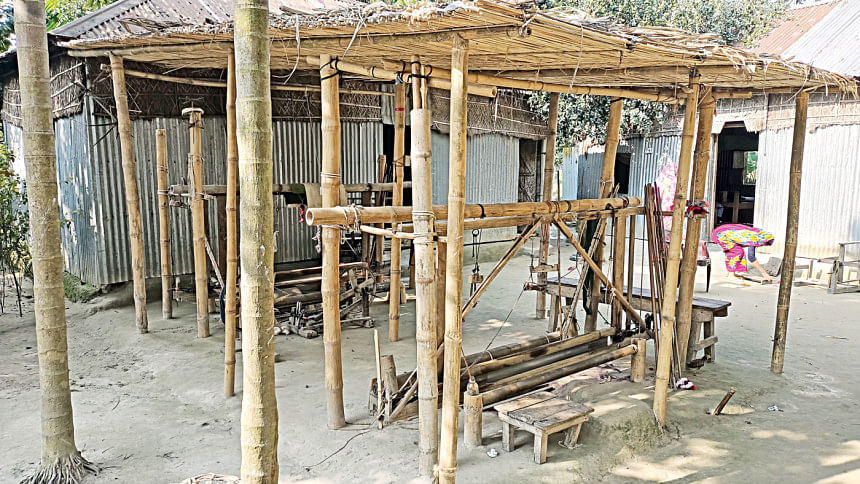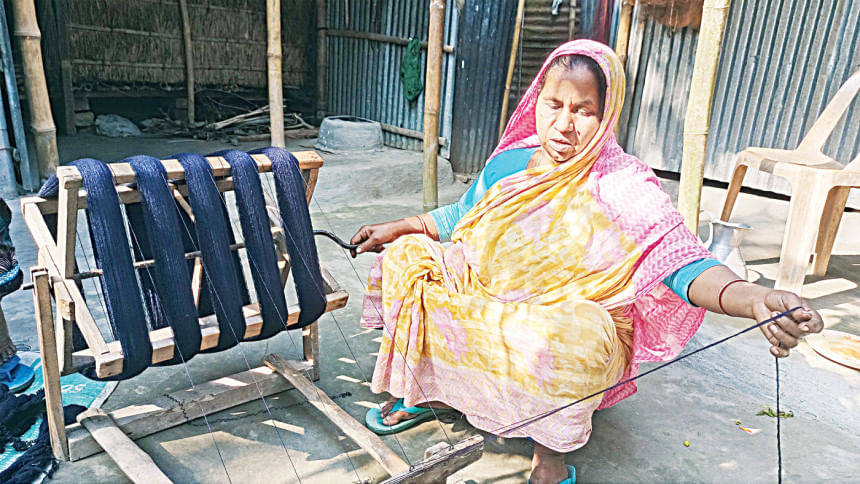Lack of demand forcing weavers to leave profession

Abdus Sattar, a resident of Mahishamuri village in Lalmonirhat's Kaliganj upazila, was a weaver by profession like his father before him, the late Amir Chand.
Sattar, who was involved in weaving since childhood, has been earning a living as a day-labourer for the last two years as he was forced to sell his handloom at a low price to make ends meet.
Still though, he hopes to raise enough capital one day to start weaving again.
Like Sattar, Alim Uddin of the same village now earns a living as a mason as he cannot maintain his expenses by weaving.
As such, his handloom is tucked away in storage but if given enough capital support, Uddin plans to return to his ancestral profession.
Uddin's late father Haran Ali taught him all he knows about weaving, a profession which once brought prosperity to his family. Now, he has to live with his wife, two sons and a daughter in extreme poverty.
Like Uddin and Sattar, many traditional weavers have been unable to hold on to their ancestral professions due to a lack of working capital.
Some sold their handlooms while others stored them away and are now earning money by joining various professions.
Some work as agricultural labourers, day labourers and on ferries while others drive rickshaws and the like.
The weavers told The Daily Star that the clothes they made were popular a decade ago, when demand.
Now though, the demand is decreasing day by day as machine-made fabrics look brighter than woven fabrics, making them the preferred choice among buyers.
However, woven fabrics are still more comfortable than their machine-made counterparts.
About 9 to 10 years ago, weavers of Kakina union would make blankets for sale year-round. In winter, these blankets were often bought by the government as well as non-government organisations (NGOs) for distribution among the cold-stricken poor people.
But ever since these blankets started being made in factories, weaved blankents are no longer being bought and now, only a few retailers buy and sell them in local markets.
Another weaver, Meher Ali, told The Daily Star they used to sell more than four lakh pieces of blankets and bedsheets every year during winter.
At the time, each weaver could sell up to 6,000 of these products. Each blanket would cost between Tk 80 to Tk 100 to make while they would sell for about Tk 200 to Tk 250.
"The capital crisis is our biggest problem. Secondly, the market advantage is not available as the value of weaving cloth is declining in the market. The number of users of weaving cloth is also decreasing day by day," Ali said.

"But weaved cloth is still being sold satisfactorily to low-income people as our fabrics are available at relatively low prices. If we get the capital and market advantage, we will be able to rise as before," he added.
Khorshed Alam, a local NGO representative, told The Daily Star that 8 to 10 years ago, he used to buy 10,000 to 12,000 pieces of weaved blankets to distribute among the poor during the winter every year but now, he distributes factory-made blankets.
Like Alam, many NGO representatives used to buy the blankets made by handlooms from weavers.
"Blankets are also available at a lower price," he said.
Weaved bedsheets can be used for a few years at least but the blankets can be used for a maximum of two years.
"So, I think weaving sheets are much better than blankets but we are getting allocations for blankets," Alam added.
Fazlal Ali, president of the Lalmonirhat Weavers' Association, told The Daily Star that there were about 1,500 handlooms in the district 10 years ago.
Now there are just 250 to 300 handlooms, all of which are in Mahishamuri village of Kakina union, but only a few of these are in operation.
Weavers have been unable to keep their handlooms running due to the lack of capital support.
"Once upon a time, the blankets and sheets weaved in Kakina were in high demand but now, there is no market for it," Ali said.
"Besides, we are not able to make much of a profit as the price of yarn has gone up," he added.
Hafizur Rahman, a weaver from Mahishamuri village, said he operated his handloom up till last year but could not start it this year due to a lack of capital.
If engaged in weaving, the worker needs to keep at least five to six maunds of yarn in stock.
But since Rahman cannot afford to buy and store these yarns, he kept his handloom inside the house.
"We make shirt fabrics, pant fabrics, bedsheets, towels, lungis, saris, and other items with our handloom," he said.
"'We dream to maintain our ancestral profession but it has become difficult for us due to a lack of capital support," Rahman added.
Sohrab Ali, a weaver from the same village, told The Daily Star that they cannot turn a profit if they buy the required yarn with interest-bearing loans.
Instead, they could have kept their professions afloat if they got interest free or low interest loan facilities.
"I have kept myself afloat with interest-bearing loans but I have not been able to make much profit," he said.
"Some 8 to 10 years ago we could have made a profit by selling handloom sheets but with the advent of big garment units, the demand for sheets has come down and we do not have enough capital to compete," he added.
Tamiz Uddin, a weaver from the same village, said he had not sold his handloom yet considering the lack of capital, he finally decided to sell.
"I am not able to make a profit by buying yarn at a higher price. If we could keep the handloom running with our own capital, we would earn Tk 800 to Tk 1,000 every day," Uddin said.
"It is very difficult to keep the handloom running. Once upon a time, weaving was going on day and night. Everyone in the family was busy. The knocking sound of the handloom filled our souls but now the handlooms are idle," he added.
Farida Begum, a weaver from Kakina village, said that she was the daughter of a weaving family and was married to a weaver.
As such, her relationship with the handloom is from birth.
Her financial situation would be better if she weave regularly but their handlooms are keeping idle and so, she spends her days lazily.
Her husband, Alim Uddin, is now working as a day labourer.
"If we had the capital, we could have kept the handloom running," she said.
Babul Mia, a local weaver and businessman of Kakina, said that at one time the business of weaving clothes was booming in the area.
Wholesalers used to come from all over the country but now, only a handful of weavers have been able to keep their operations running.
At one time, Kakina's weaved sheets were officially procured through tenders and distributed to cold-stricken people.
"This has not been happening for the last few years and weavers in the district will be wiped out in the next three to four years if they cannot resume weaving without government patronage and full capital support," Mia added.

 For all latest news, follow The Daily Star's Google News channel.
For all latest news, follow The Daily Star's Google News channel. 



Comments